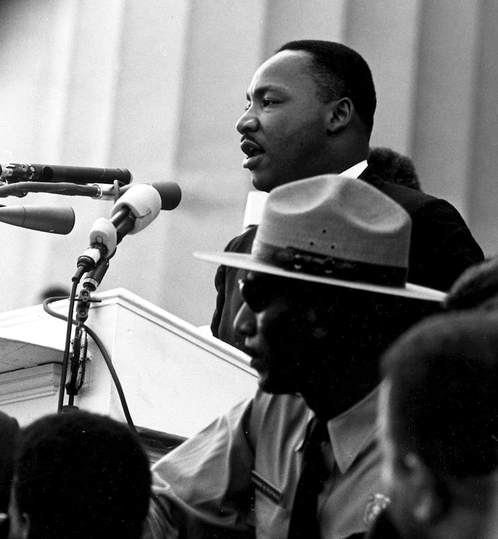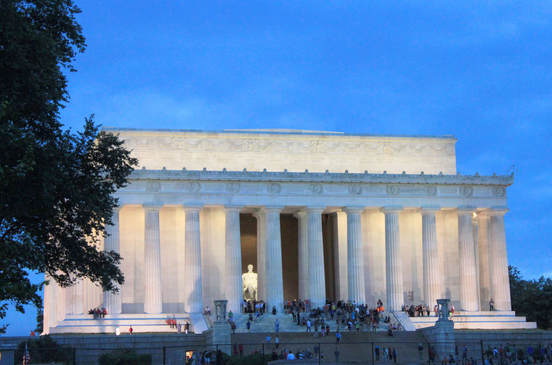In honor of the holiday last week, I reread Martin Luther King’s “I Have a Dream” speech. I marveled again at Dr. King’s brilliant capacity for words, his eloquent use of allegory and descriptive language. As a word-lover, wanna-be-writer, and artist-at-heart, I inhaled his powerful repetitive phrases and traced the shimmery golden idea-threads that King weaves so masterfully throughout his brief, beautiful plea to the government of the United States and to the American people.
I was four years old when King stood on the steps of the Lincoln Memorial in 1963, definitely not old enough to remember, or to understand, anything he said. But I grew up in the former slave state of Missouri and daily saw the reasons for, and the effects of, his speech, both positive and negative. And reviewing this seminal document has left me thinking about how far we’ve come—and how far away we’ve strayed—from Dr. King’s Dream.
I was four years old when King stood on the steps of the Lincoln Memorial in 1963, definitely not old enough to remember, or to understand, anything he said. But I grew up in the former slave state of Missouri and daily saw the reasons for, and the effects of, his speech, both positive and negative. And reviewing this seminal document has left me thinking about how far we’ve come—and how far away we’ve strayed—from Dr. King’s Dream.
I cannot begin to know what it is like to live with dark skin in America. I cannot imagine prejudice, fear, and hatred directed at me during many of my waking hours. I cannot comprehend the discouragement and despair that might certainly come from being “judged by the color of [my] skin.” But I have experienced discouragement and despair. I know prejudice, fear, judgment, and hatred. And I believe our current national political climate only reinforces the fact that Brotherhood, Equality, and Justice are ideals our country is still striving for.
Dr. King begins the speech with an allegory of the “promissory note” called the Emancipation Proclamation, a check that he says has yet to be cashed, and has even come back marked “insufficient funds” in some cases, for America’s “citizens of color.” He reiterates that “now is the time” to make this right. However, he cautions, “Let us not seek to satisfy our thirst for freedom by drinking from the cup of bitterness and hatred.”
He then implores us to live and work with Faith and Hope that Justice and Righteousness will prevail, that soon “this nation will rise up, live out the true meaning of its creed: ‘We hold these truths to be self-evident, that all men are created equal.’” And, finally, he delivers his Dream: “I have a dream that my four little children will one day live in a nation where they will not be judged by the color of their skin but by the content of their character.” This Dream involves Faith and Hope and a transformation of “the jangling discords of our nation into a beautiful symphony of brotherhood.”
Dr. King begins the speech with an allegory of the “promissory note” called the Emancipation Proclamation, a check that he says has yet to be cashed, and has even come back marked “insufficient funds” in some cases, for America’s “citizens of color.” He reiterates that “now is the time” to make this right. However, he cautions, “Let us not seek to satisfy our thirst for freedom by drinking from the cup of bitterness and hatred.”
He then implores us to live and work with Faith and Hope that Justice and Righteousness will prevail, that soon “this nation will rise up, live out the true meaning of its creed: ‘We hold these truths to be self-evident, that all men are created equal.’” And, finally, he delivers his Dream: “I have a dream that my four little children will one day live in a nation where they will not be judged by the color of their skin but by the content of their character.” This Dream involves Faith and Hope and a transformation of “the jangling discords of our nation into a beautiful symphony of brotherhood.”
To fulfill Dr. King’s Dream, and create this beautiful symphony together, we must not only NOT judge people “by the color of their skin,” but we must ALSO judge them “by the content of their character.” We must develop Charity and build Character in ourselves and others. We must transform “the jangling discords of our nation” into Charity and Brotherhood. We must live out our lives in Faith and Hope and act according to both Justice and Righteousness.
So, I will not drink “from the cup of bitterness and hatred.” I will practice Faith, Hope, and Charity. I will learn to look my neighbor in the eye, speak and act positively, and live my life “on the high plane of dignity and discipline.” I will not use physical force or mental force to make my opinion known, but “soul force.” I will allow others to make mistakes and learn life’s lessons without accusation or ridicule. I will show love and respect. I will play my part in the “beautiful symphony of brotherhood” and encourage others to do the same.
Building my own Character, I will be Free at Last.
Read Martin Luther King’s speech here: https://www.archives.gov/files/press/exhibits/dream-speech.pdf
So, I will not drink “from the cup of bitterness and hatred.” I will practice Faith, Hope, and Charity. I will learn to look my neighbor in the eye, speak and act positively, and live my life “on the high plane of dignity and discipline.” I will not use physical force or mental force to make my opinion known, but “soul force.” I will allow others to make mistakes and learn life’s lessons without accusation or ridicule. I will show love and respect. I will play my part in the “beautiful symphony of brotherhood” and encourage others to do the same.
Building my own Character, I will be Free at Last.
Read Martin Luther King’s speech here: https://www.archives.gov/files/press/exhibits/dream-speech.pdf



 RSS Feed
RSS Feed
